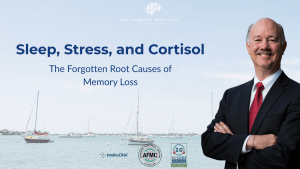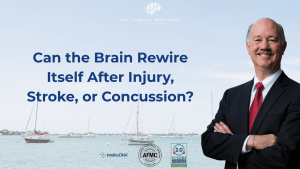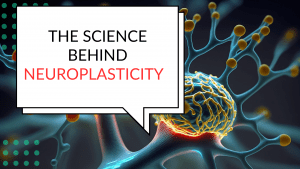The Science Behind the ReCODE Program: What the Research Shows
Last Updated: October 2025
For decades, families were told that Alzheimer’s disease could only be managed, not reversed. That belief has changed. The ReCODE Program—developed by Dr. Dale Bredesen—has demonstrated in peer-reviewed studies that cognitive decline can be reversed in many patients when the true, underlying causes are identified and corrected. At The Carroll Institute, we bring this research to life with a precise, data-driven plan that restores brain health and function.
Why ReCODE Is Different—And Why It Works
Most drugs target a single molecule, such as amyloid beta. However, cognitive decline is caused by many interacting drivers—chronic inflammation, insulin resistance, hormonal decline, toxins, infections, nutrient deficits, sleep disruption, vascular issues, and more. Consequently, one pill cannot solve a multi-factor problem. By contrast, the ReCODE Program measures each person’s unique biology and then addresses those drivers simultaneously, allowing the brain to re-establish healthy signaling and begin repairing itself.
Practically, this means your plan is personalized: anti-inflammatory nutrition, metabolic optimization, hormone balancing, detoxification when needed, targeted nutrients, sleep restoration, and—uniquely at our clinic—Functional Neurology to rebuild weakened neural pathways. Step by step, the system that governs memory is restored.
The Published Evidence: Reversal, Not Just Slowing
- Aging (2014): In “Reversal of Cognitive Decline,” 9 of 10 participants improved on objective measures after a personalized, multi-factor program now known as ReCODE. Read the study.
- Expanded Case Series: “Reversal of Cognitive Decline: 100 Patients” reported consistent improvements when the same precision approach was scaled across a larger cohort. Read the report.
- Frontiers in Aging Neuroscience (2023): A precision-medicine rationale explains why single-target drugs fail and multi-factor programs succeed. Read the paper.
- Biomedicines (2024): “Sustained Cognitive Improvement…” documented ongoing gains following a ReCODE-based plan, with measurable improvements maintained over time. Read the study.
Together, these publications establish something unprecedented: when personalized, multi-factor care is applied, many patients don’t just slow decline—they improve. In fact, improvements have been reported in memory scores, executive function, focus, sleep, and daily independence.
The Six Subtypes Clarify What To Treat
ReCODE recognizes six biological subtypes—Inflammatory (Hot), Atrophic (Cold), Glycotoxic (Sweet), Toxic (Vile), Vascular (Pale), and Traumatic (Head-injury related). Because most patients display a mix of types, precision testing guides an individualized plan. For a deeper overview, see The Six Types of Alzheimer’s Identified by the ReCODE Program.
From Testing To Targets: How We Personalize Your Plan
- Inflammation: CRP, IL-6, homocysteine; anti-inflammatory nutrition and infection evaluation.
- Metabolism: fasting insulin, HbA1c, HOMA-IR; low-glycemic or ketogenic nutrition where appropriate.
- Hormones: thyroid, estrogen/progesterone, testosterone, DHEA; carefully restoring optimal ranges.
- Toxins: mycotoxins, heavy metals, select chemicals; exposure reduction and supported detox.
- Infections: evaluation for stealth infections that perpetuate neuroinflammation.
- Genetics: APOE and advanced genomics (e.g., IntellxxDNA) to refine precision targets.
- Functional Neurology: brain mapping to identify underperforming circuits, followed by customized cognitive rehabilitation.
Because we treat the causes driving your decline, progress is not random; it is measured and repeatable. For a close look at the testing framework, explore The Importance of Comprehensive Testing in the ReCODE Program.
Why Functional Neurology Accelerates Results
Fixing biochemistry removes the “brakes,” but rebuilding the “engine” requires targeted stimulation. That’s why we integrate Functional Neurology—designed to retrain specific brain networks—alongside ReCODE. With neuroplasticity-based drills, photobiomodulation, and neurosensory motor integration, patients often recover skills like word-finding, focus, and short-term memory more quickly. As pathways strengthen, daily function returns.
Real-World Outcomes: What Patients Notice
- Sharper memory and recall (names, appointments, directions)
- Improved focus and processing speed (reading, conversations, multitasking)
- Steadier mood and better sleep (which further enhances cognition)
- Greater confidence and independence in managing daily life
Improvements commonly begin within weeks to months, then continue as inflammation recedes, metabolism stabilizes, hormones rebalance, toxins clear, and neural circuits are retrained. For the philosophical “why” behind this success, see Why the ReCODE Program Succeeds When Drugs Fail.
If You’ve Been Told “Nothing Can Be Done,” Read This
The published record now shows that a multi-factor, personalized program can reverse measurable cognitive decline. That’s why we say: if you want to do something, the ReCODE Program is the proven path forward. It is comprehensive, individualized, and—most importantly—effective.
References
- Bredesen DE. Reversal of Cognitive Decline: A Novel Therapeutic Program. Aging (2014).
- Bredesen DE. Reversal of Cognitive Decline: 100 Patients. J Alzheimers Dis Reports (2018).
- Bredesen DE, Catlin C, et al. Precision Medicine Approach to Alzheimer’s Disease: Rationale and Implications. Frontiers in Aging Neuroscience (2023).
- Bredesen DE, Hathaway A. Sustained Cognitive Improvement in Alzheimer’s Disease Patients Following a Precision Medicine Protocol. Biomedicines (2024).
- Apollo Health. Setting the Record Straight: Yes, Cognitive Decline Can Be Reversed. (2024).
Medically reviewed by: Dr. Garland Glenn, DC, PhD, AFMC (Advanced Functional Medicine Clinician)
The Carroll Institute — serving patients in Sarasota, FL
Learn more about the ReCODE Program · About Dr. Garland Glenn
Educational content only and not a substitute for personalized medical advice.

Dr. Garland Glenn, DC, PhD, IFM, AFMC
Founder & Clinical Director, The Carroll Institute — Sarasota, FL
Dr. Garland Glenn is a board-certified chiropractic physician and functional medicine practitioner specializing in cognitive health, neurodegeneration, and root-cause medicine. Certified as an AFMC (Advanced Functional Medicine Clinician) and Institute for Functional Medicine (IFM) trained, he has also completed over 500 hours of advanced training in Functional Neurology under Dr. Ted Carrick, founder of the Carrick Institute.
At The Carroll Institute, Dr. Glenn leads Sarasota’s only ReCODE-certified Functional Neurology program, helping patients reverse or prevent cognitive decline through the Bredesen ReCODE Protocol, neuroplasticity exercises, and personalized functional medicine care.
Learn more about his background and approach at About Dr. Garland Glenn.
– schedule now –
free discovery call
To help you get started, we offer a free 20-minute Discovery Phone Consultation. During this call, you will be able to talk with one of our Certified Brain Health Coaches about what going on with you or your loved one and find out if we can help. Please review our FAQs prior to scheduling your free call. We look forward to talking with you soon and helping you Save Your Brain.
(yes, it’s totally free!)
ReCODE® is a registered program developed by Dr. Dale Bredesen and licensed through Apollo Health. Dr. Garland Glenn is a certified ReCODE practitioner.



